Galva’s Summer Music Series Going Online, Other Quad-Cities’ Series May Follow
Galva’s summer music series will be postponed a year, and a virtual one will take its place soon, a trend which seems to be gaining momentum as the uncertainty of a summer under the cloud of Covid-19 looms before us.
As part of the cascade of Covid-19-related closures, the third-annual Levitt AMP Galva Music Series this summer is canceled, and its organizer is working on creating a more compressed online series in its place.
The 12 Sunday night concerts in Wiley Park, free to the public, were due to start May 31. John Taylor of Cambridge, president of the series and concert organizer, said it was a difficult but necessary decision.
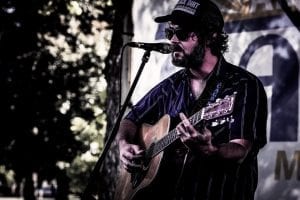
Galva’s live music series.
“Even when things do eventually open up fully, or at all, it’s probably gonna be different for a while,” he said recently.
“We’re expecting it’s not going to be a fully open situation. It’ll probably be where crowd sizes are limited for a portion of time. And being the concert series is in a public park, and there’s really no way to control the size of the crowd in a public park. It’d be very difficult. That really played into our decision.”
For the third year in a row, last December, the Galva Arts Council won a $25,000 matching grant to bring a free live-music series to Wiley Park.
Sponsored by the Mortimer & Mimi Levitt Foundation, dedicated to strengthening the social fabric of America through free live music, Galva earned the grant through becoming a finalist and public online voting. The funds are for towns and cities with populations of less than 400,000.
Each 2020 grant winner will automatically be rolled over to 2021, and be eligible for a $5,000 mini-grant for alternate programming this year, Taylor said. So far, half of the 20 cities nationwide have canceled this summer’s series, and he expects all will. The confusion surrounding life post-coronavirus puts their plans in flux.
Part of the grant said the outdoor series can’t have a fixed entry point, but has to be totally open, Taylor said. They considered just postponing the series to later in the summer, and maybe just doing 4 or 5 dates. “Things are just so uncertain, we didn’t want to take that risk,” he said.
The pandemic is “stressful for arts & culture organizations, with many facing uncertain futures in the wake of closures and event cancellations,” the Levitt Foundation posted on March 19. “For Levitt venues and Levitt AMP concert sites, their concert series involves months of planning, and concert cancellations and postponements hurt each nonprofit organization financially.
“Given these unprecedented times, we hope local funders, sponsors and individuals will continue to rally behind their community’s Friends of Levitt and Levitt AMP nonprofits and show their support for these organizations who work tirelessly year-round to create joyful, welcoming and high-quality arts experiences for everyone.”
“Every area is doing things differently – every state, every county, every country,” Taylor said, noting the contrast between Iowa and Illinois in re-opening businesses. “And we’re dealing with acts from all over the place. Just the level of uncertainty of what restrictions might be out there, are gonna keep a lot of musicians from touring for a while, a good while.”
Illinois has a stay-at-home order in place until May 30 (while Iowa never formally shut down), and no one knows what Illinois guidelines will be over the summer, how they’ll be enforced, and whether people will be receptive, Taylor said.
As of May 13, there were 987 Covid infections in Scott, Rock Island, Whiteside, and Henry counties, and 33 deaths from the virus. Illinois altogether has seen 83,168 cases, and 3,617 deaths, while Iowa has 13,389 positive cases, and 306 deaths.
Iowa Gov. Kim Reynolds is allowing all 99 counties to open restaurants Friday, among other business, with specific restrictions.
“Iowa is different than Illinois,” Taylor said. “We were there this past weekend, and things were mostly open, completely different than Illinois. If you just cross the river and see the difference, it’s pretty amazing how different it is.”
New “Play It Forward” campaign
In lieu of the canceled Levitt AMP series, Taylor plans to use $10,000 to choose up to 20 local artists to perform at Bishop Hill Creative Commons, over two weekends by the end of May, and give them $500 each. The concerts will be live-streamed online and each will have the opportunity to raise money through donations.
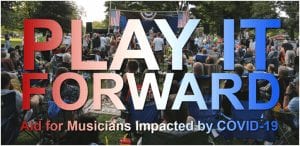 To support musicians during this critical time, Galva Arts Council has launched the new “Play it Forward” campaign. This program will distribute grants to musicians facing dire financial emergencies due to Covid-19 and broadcast a performance by the artist, recorded without an audience, where additional tips will be collected for the performer, Taylor said.
To support musicians during this critical time, Galva Arts Council has launched the new “Play it Forward” campaign. This program will distribute grants to musicians facing dire financial emergencies due to Covid-19 and broadcast a performance by the artist, recorded without an audience, where additional tips will be collected for the performer, Taylor said.
Submissions can be made on the Play It Forward page at HeartlandConnections.com and will be accepted through Sunday, May 17. Grant recipients will be chosen by lottery and announced on May 18. Artists will be notified by email.
Those who wish to contribute to this fund should visit the Play It Forward page on HeartlandConnections.com or mail a check to Galva Arts Council, PO Box 29, Galva, IL 61434, with a memo of “Play It Forward.”
The campaign is a partnership between Heartland Connections, Levitt AMP Galva Music Series, Galva Arts Council, Peoria Music Live, Done Right TV, and Bishop Hill Creative Commons and is made possible by generous support from the Galesburg Community Foundation.
“And we’re gonna do a virtual series outside of that, with some other artists,” Taylor said. “That will be probably over the course of the summer. And we’ll kind of play that by ear, depending on how conditions are. If things change, and we’re able to do some of these concerts with an audience, we will.”
“If conditions change, we may do concerts at the park in Galva or Cambridge, that will happen, probably with local or regional acts that haven’t been working,” he said. “It’s a tough thing. Just a lot of uncertainty in the industry right now. For us to commit to do dates, really puts and really everyone, at risk.”
“It wasn’t a decision anyone wanted to make, but that’s the situation we were in,” Taylor said. “We made the best choice we could.”
All the artists for Galva were booked, and all the acts have been invited back next year. Most of them have shown interest; some are on the fence, especially the international ones, he said.
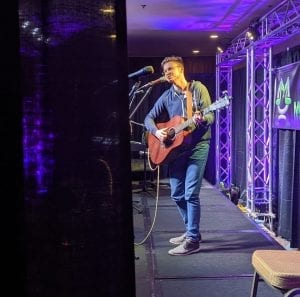
Lewis Knudsen
The only local artist who was booked was Lewis Knudsen of Rock Island, in August, to be part of a planned Quad-Cities Live Music Month, led by River Music Experience and Visit Quad Cities. The goal was to ramp up the number of concerts that month, and heavily promote them, to bring in more out-of-town visitors, Taylor said.
“What we try to do here is bring in music that has not been played here in the area, things that people can’t see easily,” he said of the Galva series. Plans for Live Music Month are also up in the air, he added.
“Venues, especially in bigger cities, they really do drive the economy,” Taylor said. “People will come in from the outside areas, come \in, go to dinner, see a show, and maybe stay overnight in a hotel. It is a big tourism driver. Without it, it’ll be tough to get things back to how they used to be. I don’t think thing will be the same for a while at all.”
Rescuing a battered industry
Taylor is a member of the newly formed National Independent Venue Association. Its head recently told Rolling Stone, 90% of its 1,300 member venues do not have cash on hand to last more than six months without federal intervention, and 55% say they don’t have enough to last more than three months.
“Just trying to navigate the situation and trying to figure out how to just make it through,” Taylor said. “That’s the biggest thing right now is being able to make it through to the other side, where we can start doing things again.”
“A lot of venues, they’re struggling too, not being able to be open, ‘cause most of them also are bars,” he said. “It’s a tough time for the music industry.”
“Another piece of this too, even though things may open up again, I don’t know how eager people are gonna be to get out,” Taylor said. “I think some people are very anxious and people who are still not comfortable.”
Rolling Stone recently reported that until the crisis hit, the live-music business was on track to generate $12.2 billion in box-office revenue in 2020, according to Pollstar. If concerts manage to start up in late August, Pollstar estimates that the industry will lose about $5.2 billion in potential revenue for the year — but if venues end up closed through December, losses could balloon to $8.9 billion.
Many big summer tours have been put on hold, including Taylor Swift – who canceled all 2020 dates. The Ravinia Festival in suburban Chicago (home to the Chicago Symphony Orchestra) is canceling its 2020 summer season for the first time since 1935.
What this holds for the Quad-Cities outdoor music scene over the summer isn’t fully clear. But what is certain is that this will be a very different summer than those past to which we’ve been accustomed.



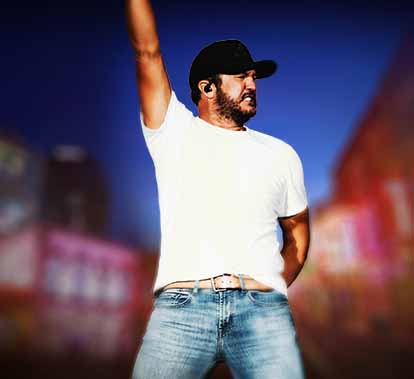
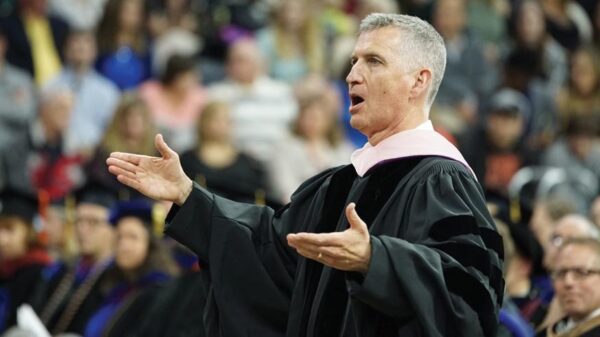








Leave a Reply
You must be logged in to post a comment.